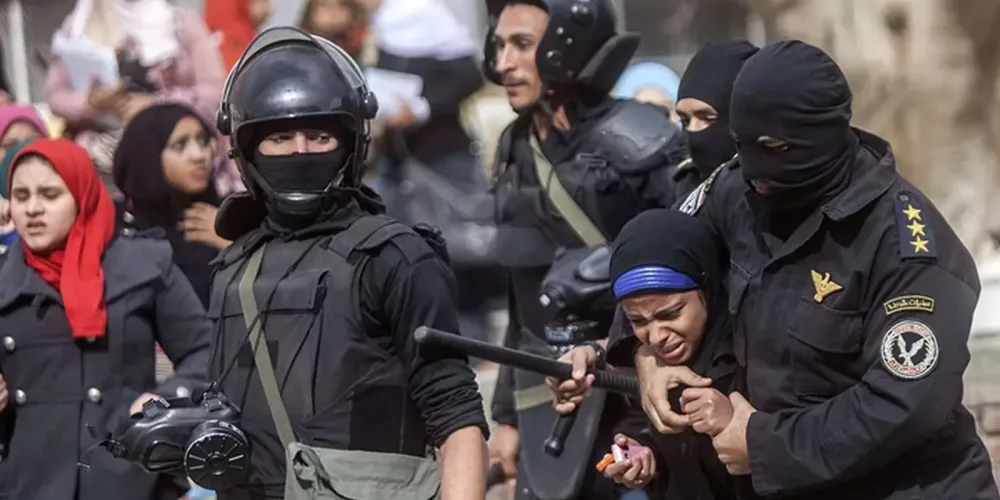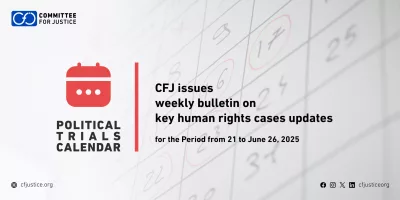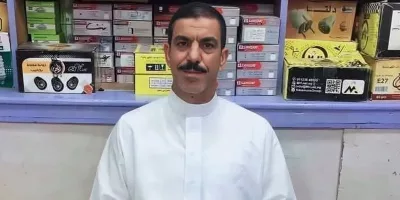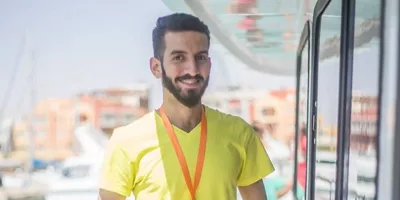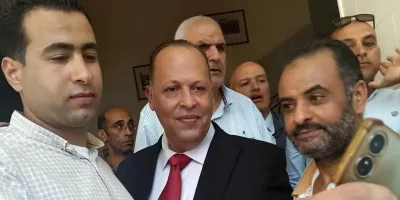Press Release
The event, titled “Shadows of the Arab Spring and Civil Space in North Africa,” took place on Sunday, October 20, during the 81st session of the African Commission on Human and Peoples’ Rights in Banjul, Gambia. Organized by African Defenders, the session hosted several human rights activists, including the Regional and International Communications Officer of the Committee for Justice (CFJ), Usame Mehmetoglu. He addressed the human rights situation in Egypt, the obstacles confronting human rights defenders, and approaches to supporting civil liberties in the region.
– Key human rights issues in Egypt and their impact on human rights work:
The discussion began with a question for Oglu about the main challenges to human rights in Egypt and their effects on the environment for human rights defenders. He responded, “In Egypt, we have witnessed a significant deterioration in human rights over recent years. Systematic violations have become part of state policy, encompassing forced disappearances, torture in detention centers, arbitrary arrests, extrajudicial executions, and harsh prison conditions. These violations are not targeted at specific groups alone but are directed toward civil society as a whole, impacting lawyers, activists, and human rights advocates across the board.”
Oglu noted that the number of political prisoners has exceeded 60,000 over the past decade alone, reflecting the rise in repression against those expressing opinions freely or advocating for human rights. Human rights defenders in Egypt operate in a challenging environment where they face constant intimidation, surveillance, and harassment, alongside travel bans and asset freezes designed to cripple their activities and hinder their work.
He further highlighted the Egyptian government’s attempts to legitimize repressive policies through restrictive laws aimed at suppressing freedom of expression and limiting human rights work. Among these, he pointed to the Associations Law No. 70 of 2017, describing it not as a law to regulate civil society but one to control it. This law imposes severe restrictions on civil society organizations, making it nearly impossible for any independent body to operate freely, especially when it focuses on human rights or transparency.
Oglu also mentioned the Anti-Terrorism Law No. 94 of 2015, which grants authorities broad powers to treat activists as national security threats, leading to the detention of many journalists and peaceful protesters. Additionally, the 2018 Cybercrimes Law has enabled the government to monitor online activities extensively, meaning that even a simple critique of government policies on social media can lead to legal prosecution.
– The role of the African Commission in supporting human rights defenders:
When discussing the significance of sessions of the African Commission on Human and Peoples’ Rights and its role in supporting human rights defenders, Oglu explained that these sessions provide a genuine opportunity to bring human rights issues to the regional and international level. The existence of a dedicated African Commission allows human rights defenders to present reports and document abuses directly before African state representatives and other mechanisms within the African Union, including both officials and fellow human rights defenders from across the continent.
Oglu stated, “The African Commission session is not merely a platform for discussion but a powerful tool for pressing improvements in human rights conditions, publicly highlighting violations, and fostering African solidarity on these issues.” He stressed that the challenges facing human rights defenders in Egypt and North Africa are not only local matters but part of a broader picture requiring appropriate regional and international responses.
He added that the various African Union mechanisms, including special rapporteurs, play a critical role in pressuring governments by issuing recommendations and urgent appeals for human rights improvements. Oglu emphasized that the African Commission should not merely respond to submitted complaints but should also take proactive steps to urge governments to amend policies and engage in genuine dialogue to improve human rights.
– Strategy to enhance North African human rights defenders’ participation:
Discussing strategies to enhance North African human rights defenders’ involvement with the African Commission’s mechanisms, Oglu explained that meaningful participation requires overcoming barriers to access these mechanisms. “Human rights defenders in North Africa, particularly in Egypt, face intense repression and threats that deter them from openly participating in regional events, as such involvement could provoke direct retaliation by governments.”
Oglu suggested that the first step towards improving participation is to raise awareness of the African Commission’s mechanisms, noting that many North African defenders are not sufficiently informed about engaging with these mechanisms, whether through submitting complaints, attending hearings, or utilizing special rapporteurs’ mandates. He called for workshops and training sessions in collaboration with the Commission to build defenders’ capacities and equip them with the knowledge needed to protect their rights and support the victims they advocate for.
He also stressed the need to establish safe channels for participation, allowing defenders to contribute without fearing retaliation. Oglu encouraged the Commission to set up rapid-response mechanisms to protect defenders under threat and provide support through systems enabling them to voice concerns and document abuses without risking their safety.
– Strengthening cooperation between North African and Sub-Saharan human rights defenders:
In his remarks, Oglu emphasized the importance of bolstering collaboration between human rights defenders in North Africa and Sub-Saharan Africa as a robust means to advance human rights efforts across the continent. He pointed to an urgent need to unify efforts and exchange expertise between defenders in different African regions to tackle shared challenges and present a unified front against abuses.
Oglu noted that defenders in North Africa and Sub-Saharan Africa face similar challenges, including restrictions on civil liberties and repression of civil society, making it essential to build strong and lasting alliances between them. He commented, “Cooperation across regions can amplify human rights efforts and increase their impact, especially through joint campaigns, shadow reports, and collective statements.”
He also highlighted that collaborative efforts add momentum to human rights causes in Africa, drawing international attention to the ongoing abuses facing human rights defenders. Oglu expressed hope that such sessions would provide a strong impetus for building bridges of cooperation and enhancing continental human rights efforts.
– CFJ’s commitment to supporting North African human rights defenders:
Oglu concluded his participation by reaffirming CFJ’s commitment to continuing its support for North African human rights defenders despite the challenges. He stated, “We believe that a vibrant civic space is essential to achieve justice and accountability. Human rights defenders’ voices are the lifeline for human dignity, and we will not allow these voices to be silenced.”
He also affirmed that CFJ would continue working to enhance civic space and unite efforts with other human rights organizations to maximize impact regionally and internationally. Oglu called for collective action to press governments to implement meaningful changes that guarantee justice and freedoms for all.

